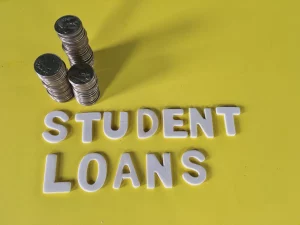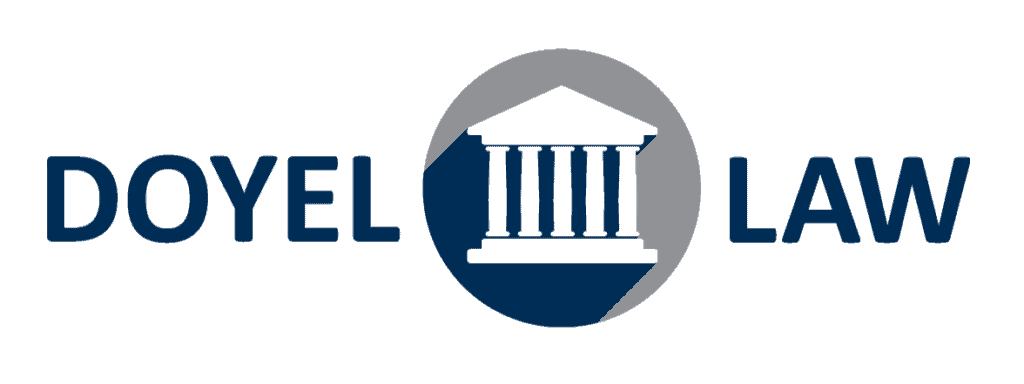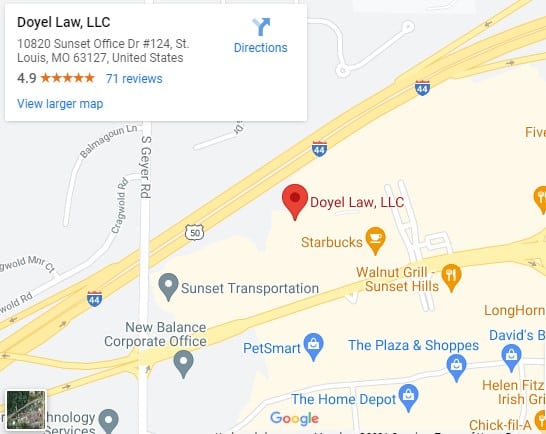Student Loan Attorneys in Sunset Hills, Missouri
Student loans can be highly stressful. Too many consumers are frustrated by the fact that the education they obtained was more expensive than the earnings potential they gained. The figures simply do not add up. The federal government has stepped in, and student loan borrowers now have various options to assist them in managing their debt. Doing nothing could have profound implications.
When people default on their student loans, the Department of Education can garnish earnings and even confiscate tax refunds. If you think you’re headed down this road, consulting with Doyel Law could save you a lot of money and worry. Our Sunset Hills bankruptcy attorneys can help you rehabilitate your loans and get them out of default and into a manageable monthly payment. Contact us now!
Why Do I Need a Student Loan Attorney in Missouri?
Student loan law is a complicated issue that changes frequently. If you get a student loan lawyer to help you with your Student Loan issues, they will examine your situation, write up all of your alternatives, discuss them with you, and then file the proper paperwork on your behalf for whichever option you choose.
Our student loan lawyers in Missouri can help you ease your school debts, and we may be able to completely erase Student Loans in some cases. Although we cannot guarantee that we will be able to eliminate your liabilities because each scenario is unique. Still, we can ensure that if you employ the Student Loan lawyer at Doyel Law, you will be aware of all of your alternatives and will regain control over your Student Loan concerns.
What is Bankruptcy?
Bankruptcy is a legal process that involves a person or company that is unable to pay its debts. The bankruptcy procedure begins with a petition submitted by the debtor or on behalf of creditors, depending on the situation. The debtor’s assets are all measured and analyzed, and the assets may be utilized to pay off some of the debt.
Bankruptcy allows an individual or organization to start over by forgiving debts that are simply unpayable and allowing creditors the opportunity to get some kind of repayment depending on the assets available for liquidation.
The debtor gets released of debt obligations incurred prior to filing for bankruptcy when bankruptcy proceedings are successfully completed.
What is a Student Loan?

Federal student loans, which are supported by the federal government, and private student loans (a credit union, bank, state agency, or school), which are made by a lender, are the two types of student loans available.
Federal Student Loan
When compared to private loans, federal loans offer numerous benefits. They typically feature lower interest rates and more flexible repayment alternatives than banks and other private financial institutions. They don’t even ask for a credit check or a co-signer. You do not have to return a federal loan until you graduate/leave college or drop below half-time status.
You must apply for federal student loans yearly by completing the Free Application for Federal Student Aid (FAFSA). This information will be used to assess your eligibility. Your final financial aid package will be determined by the school of your choice.
How Do Federal Student Loans work?
Scholarships, work opportunities, and grants will not cover all a student’s education expenses. As a result, you may need to explore student loans. However, not all loans are equal.
Federal Direct Loan
Federal Direct Loans are issued by the Department of Education. Direct Subsidized Loans, Direct Unsubsidized Loans, Direct PLUS Loans, and Direct Consolidation Loans are the four basic forms of Direct Loans.
- Direct Subsidized Loans
This type of loan is available to undergraduate students who can demonstrate a financial need. During the following periods, the government is the one that pays the interest through Direct Subsidized Loan:
- while you’re at least half the time in school
- throughout the grace period, which is applicable in most situations,
- during a deferment period
- Direct Unsubsidized Loans
You and not the government are the one that always pay the interest on an unsubsidized loan. Undergraduate and graduate students can apply for Direct Unsubsidized Loans without showing financial need.
- Direct PLUS Loans
Professional or graduate students enrolled at least half the time at a school with a program leading to a professional or graduate degree or certificate, as well as parent/s of a dependent undergraduate student at least enrolled half-time at a qualified school, are eligible for Direct PLUS Loans.
Unlike the other federal student loans, the application procedure includes a credit check, and candidates cannot have a bad credit history.
- Direct Consolidation Loans
You can consolidate your federal school loans in just one loan with a Direct Consolidation Loan.
Pros and Cons of Federal Student Loans
When compared with private student loans, federal student loans provide many benefits and only a few consequences.
Advantages:
- This type of student loan includes a variety of repayment choices that might help you save money on your monthly payment.
- There are several ways to cancel federal student loans.
- All student loans of this type have fixed interest rates since 2006.
- Deferment and forbearance are options for federal student loans.
- Private student loans often demand a good credit history or may be a co-signer with also a good credit history, but federal student loans do not.
- A Federal Direct Consolidation Loan can be used to consolidate federal student loans. (This loan cannot be used to consolidate private student loans.)
- Prepayment penalties are not charged on federal student loans. You won’t have to pay any additional costs if you pay off your debts early.
Disadvantages:
If you default on this type of student loan, the government has more alternatives than a private lender to collect from you. The federal government has the authority to garnish your salary without a court order. Your tax refund and some Social Security payments may potentially be intercepted.
Furthermore, there is no statute of limitations on federal student loans. However, remember that the different repayment options available with federal student loans make default far less likely in the first place.
Private Student Loans
The terms of a private loan are determined by the lending institution. It’s a good idea to check the terms of your loan in detail and see if you can pay down the interest part while still in school to keep your loan from increasing tremendously over your college years.
How Private Student Loans work?
This type of loan is taken out from a credit union, bank, or other private lender to support post-secondary education expenses that is not guaranteed by the federal government
Pros and Cons of Private Student Loans
Although private student loans have certain advantages, the vast list of disadvantages far outweighs them.
Advantages:
The key benefit of private student loans is that they are available after you have exhausted your federal loan options. Unfortunately, with the escalating expense of college and graduate school, many students are forced to take out private loans because their federal student loans have been maxed out.
Private student loans, unlike federal student loans, are subject to a statute of limitations if you default. The statute of limitations varies by state, although it usually lasts between three and ten years. Lenders have limited possibilities to collect from you if the statute of limitations has expired.
Disadvantages:
The following are the most significant disadvantages of private student loans:
- increased interest rates (typically)
- The interest rate may fluctuate.
- payback periods are less flexible, and
- deferment, forbearance, and cancellation options are not available.
Furthermore, repaying your private student loans is not always simple. Borrowers with private student loans have complained about a variety of issues with loan repayment, including dealing with loan servicers that:
- payments are frequently lost.
- when borrowers aim to pay down their loans faster, they misapply funds.
- clients are not notified when their accounts are transferred to new servicers, and
- participate in various tactics that make it difficult for borrowers to obtain information about and repay their loans.
Student Loans in Default
Many people cannot eliminate student loan debt, but with a qualified Missouri student debt lawyer, many can get a better payment plan. Many of the millions of Americans who are struggling to pay off student loans want to know if they can lessen or erase their debt. Student loan debt can be discharged in very limited conditions. However, most people will not be able to eliminate all or portion of their debt.
The good news is that some people may be eligible for lower monthly payments, a temporary payment suspension, or other options for better managing their student loan payments.
Doyel Law wants to put you in the best possible position to deal with your debt. We can assist you in interacting with your servicer or in comprehending the various repayment, deferment, forbearance, and forgiveness options for federal student loans, and among other things, all in order to provide you with the student debt relief you need.
And if you have more legal concerns regarding Bankruptcy and Estate Planning, Doyel Law can also help you out. So, hurry up and get in touch with us right away!


